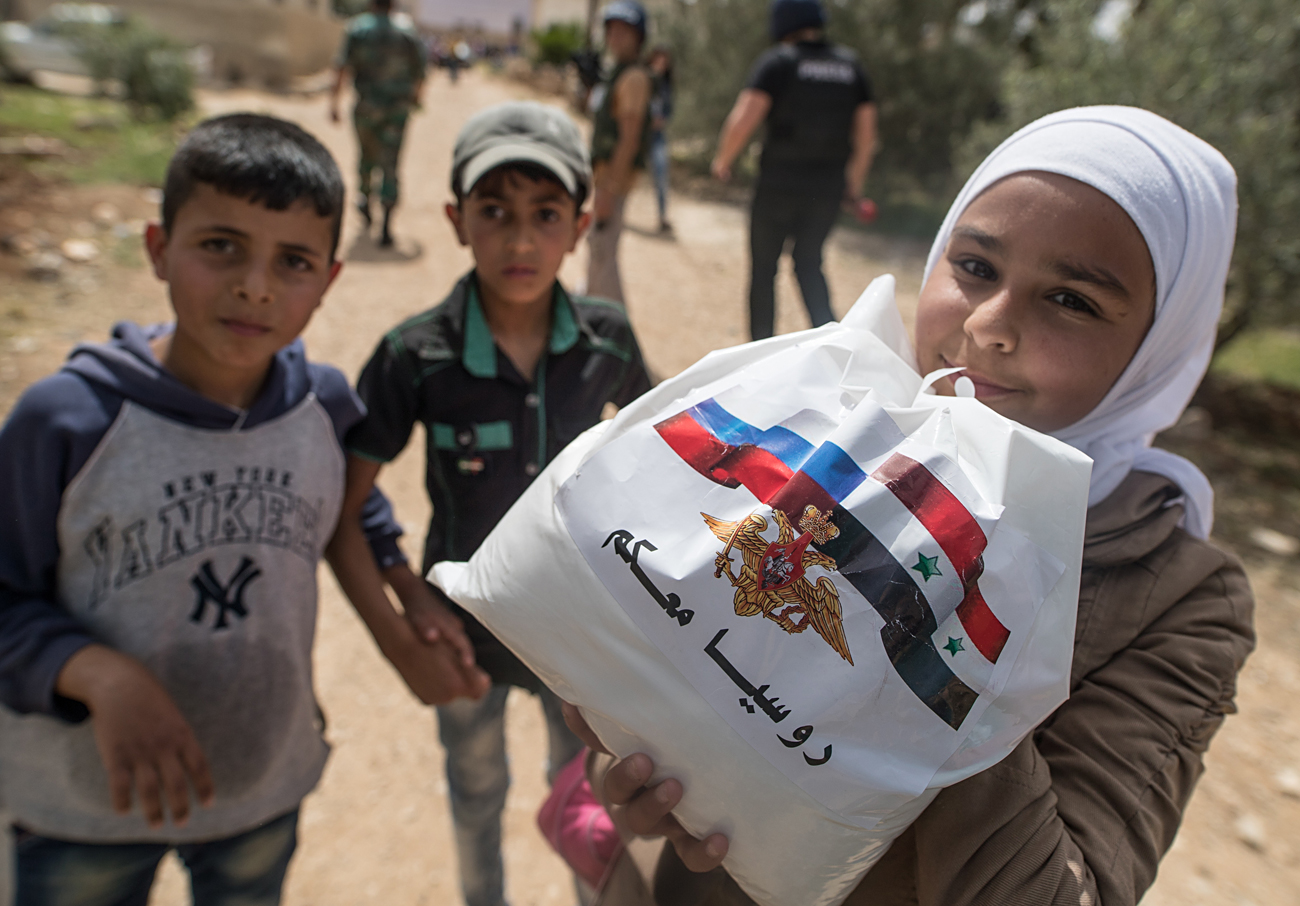What lies behind Russia’s humanitarian operation in Aleppo?

DARAA GOVERNORATE, SYRIA. Syrian children receive Russian humanitarian aid in the settlement of Alkin.
Sergei Bobylev/TASSRussia’s Defence Minister Sergei Shoigu on July 28 announced the launch of a large-scale humanitarian operation in rebel-held Aleppo, which is surrounded by troops loyal to Syrian leader Bashar al-Assad.
Humanitarian corridors were set up to allow civilians to leave the city. Militants too can avail themselves of these corridors. Assad,the same day, guaranteed amnesty to all those militants who were prepared to lay down their arms.
The operation has already lasted well over a week. Russia has, since the mission was launched, dispatched over 18 tons of foodstuffs and medicine to Aleppo. The humanitarian relief is made available to the residents at dedicated points inside the city and is being airlifted to them.
According to the Kremlin, the Russian helicopter that was downed by terrorists on August 1 was returning from one such mission, having allegedly airlifted humanitarian aid to Aleppo (although photographs of the crash site published on Twitter indicate that it may in fact have been carrying arms).
Offensive very likely
Aleppo, where fighting has been in progress since 2012, is one of the key locations where Assad’s troops and rebels came in direct conflict with each other in the Syrian war.
Representatives of the Russian Foreign Ministry have categorically denied that once the humanitarian operation is over, Assad’s troops, with which Russia is allied, will launch an offensive against the city. However, Russian experts are convinced an attack by the Syrian army is almost inevitable.
“The corridors are intended to reduce the concentration of civilians and rebels inside the city as much as possible,” said Arabic scholar Leonid Isayev, senior lecturer with the Department of Political Sciences at the Higher School of Economics in Moscow.
Isayev believes the Syrian army will have a difficult job fighting urban warfare and the more militants and civilians leave Aleppo, the better it will be for Assad.
Fyodor Lukyanov, editor-in-chief of the Russia in Global Politics magazine, believes that Russian diplomats are denying the possibility of an offensive only for political ends.
“We should not fool ourselves. Clearly, the humanitarian operation is just a part of an overall offensive that Assad is conducting with the support of the Russian military,” Lukyanov told RIR.
An important step for Russia’s reputation
Vladimir Akhmedov, senior researcher at the Institute of Oriental Studies under the Russian Academy of Sciences said one should not underestimate the most obvious purpose of the humanitarian operation – to aid civilians and to get them out of danger.
“In my view, the operation is a very good move: to feed the population not with bullets and bombs but to feed them for real,” he said. “If people are provided with humanitarian aid, it could expand the support base for our actions in Syria,” said Akhmedov, who believes that Russia needs to secure the support of Syrians who live in areas controlled by the rebels, to ensure success in Syria.
Cool reaction from U.S.
Russia and Syrian government troops started the humanitarian operation without a prior discussion with the United Nations or the United States. While the UN special envoy for Syria, Staffan de Mistura, has welcomed the initiative, the reaction from the U.S. has been rather more reserved.
U.S. Secretary of State John Kerry said that if the humanitarian operation in Aleppo turns out to be a ruse (i.e. if Assad launches an offensive), there is a risk “of completely breaking apart the level of cooperation” between Moscow and Washington on Syria.
“Russia and the U.S. have very different views as regards Syria’s future,” said Lukyanov. “That is why Russia often acts unilaterally, implementing a plan of its own.”
Russia, he continued, would benefit from a victory for Assad in the battle for Aleppo, one of Syria’s key cities. The U.S., on the contrary, is seeking to prevent Syrian government troops from capturing Aleppo and is extremely wary of Russian initiatives about the city.
Negotiations under question
According to Lukyanov, a possible offensive on Aleppo may affect the next round of the Geneva talks on Syria set for late August.
“If active hostilities break out between Assad and the opposition, the Geneva process may ‘freeze’ yet again,” he said, though he added that sooner or later hostilities will end and the negotiations will resume.
He believes it is the side that wins in the battle for Aleppo – whether it be Assad or the opposition – that will have a stronger hand in those negotiations.
All rights reserved by Rossiyskaya Gazeta.
Subscribe
to our newsletter!
Get the week's best stories straight to your inbox